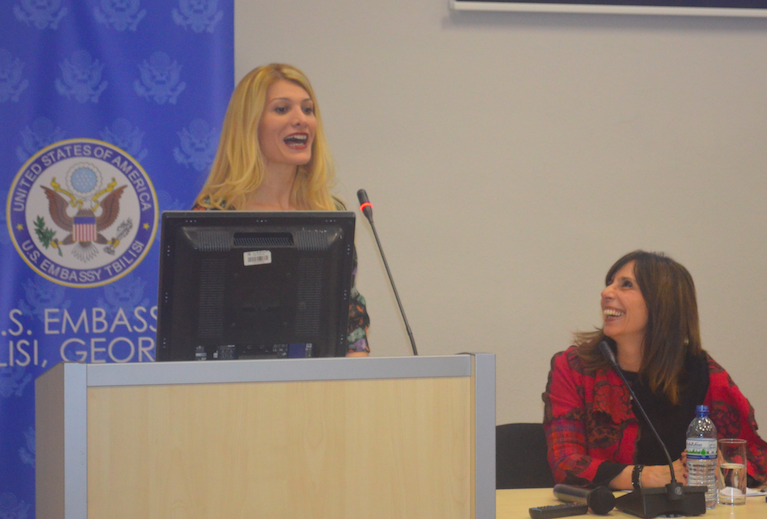Championing Women’s Equality in the Republic of Georgia

As part of Rania’s recent visit to the Republic of Georgia through the U.S. State Department and U.S. Embassy in Tbilisi, Rania keynoted at Ilia University on March 19, 2015. Two students were selected by the university to speak during the program. Larisa Pataraia’s leadership and speech inspired us and we thought you’d enjoy it too.
Dear Guests, Colleagues, and Students,
I am honored to address such a diverse audience and would like to use this opportunity to talk about women’s rights in today’s Georgia. I hope that those who show empathy towards existing reality will once again think on what they can do for gender equality; those who see the problem will strengthen their resolve; and those who fight for the better future will be encouraged to farther advocate for women’s right.
I would like to bring your attention to the Social Progress Index in Georgia, the reasons for Georgia’s low-ranking and possible solutions to the gender inequality.
As you may already know, three years ago Ilia state University received an affiliation status from Harvard Business School. Since then, we have had a unique chance to follow and be involved in latest academic achievements. This is the first time I have had an opportunity to thank the U.S. embassy in Georgia, and especially His Excellency Ambassador Richard Norland for his support in affiliation process. In 2013 while visiting Harvard Business School, the Social Progress Index was introduced as a newest technique to measure the level of a country’s social welfare using nontraditional tools of evaluation. Based on this index, Georgia was ranked 29th out of 50 countries.
If we look deeper, we will find that the current ranking was low for the most part because of the unfavorable track record in human rights and gender equality. This finding motivated us at Ilia business School to begin research and study women as active stakeholders in Georgia’s social life and the economy. I won’t go into too many details of the study, but will just share with you some of our findings. In private sector, only 12% of executive-level positions are held by women. Women are paid 50% less than men for the same job performed. We are not involved in decision making processes. No inclusive environment is guaranteed for women. Out of 150 members of parliament, only 18 are women. We really have to work hard to fix that.
It will take years to achieve gender equality in our society, but it also depends on what we do to change existing realities. Stereotypical thinking, patriarchal-dominant preferences, religion, and culture are the areas that have a significant influence, and today, are decided on the grounds of gender inequality. The scope of women’s self-realization is limited, which negatively reflect on the country’s socio-economic development.
Society at large is in a position to change gender inequality in Georgia, but in this case we need champions – persons who will take leadership to identify this problem and advocate for change. In November 2014, the Georgian women’s movement was declared itself as the agent of social change. It unites over 500 women activists who raise their voice against violence and discrimination; the movement advocates equal rights and opportunities for all.
Women in Georgia will continue to struggle for equality but one day there won’t exist glass ceiling for us. We believe that we can strengthen each other with full support, based on our shared values.
Thank you for your attention and thank you to organizers of this event, for giving us the opportunity to listen to Rania Anderson, one of the best role models for every woman.
Larisa has more than ten years of experience working both in the private and public sectors. She held various executive positions in different companies, including CEO, CFO, Sales Director, Project Manager and the Head of Procurement Department. Currently, she is the Executive of Harvard Business School MOC Program at IIia State University. Since 2010, she has been a visiting professor at Ilia State University, giving lectures in strategic management for Business School and MPA students, as well as for Caucasus School of Business. She also teaches a Microeconomics of Competitiveness course in the MBA program at ISU. In 2010 she received MBA, majoring in financial management. She received her bachelor degree in 2004 in General Psychology. Currently, she is working on her doctorate degree in the business administration program at ISU. Her research interests include strategic and gender issues. Recently she works as a researcher at Ilia State University and is a partner of Georgian business consulting company “Start Business Solutions.” Larisa is a blogger at Forbes Georgia.